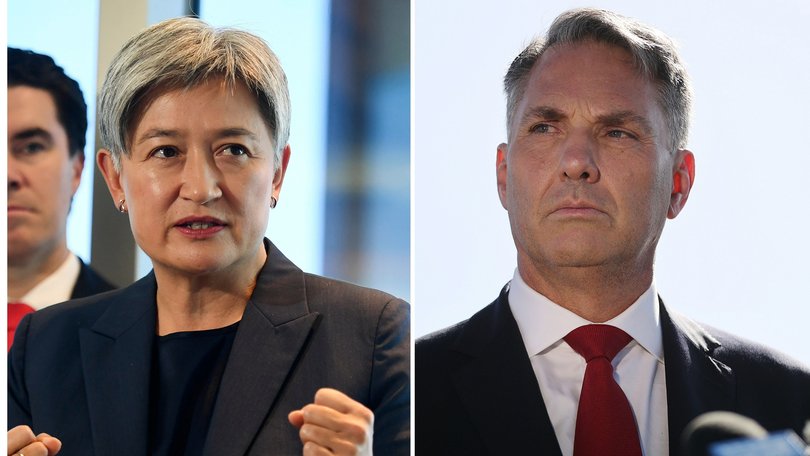Tokyo 2+2 talks: Wong says Australia and Japan must lead Indo-Pacific coalition for regional security
Richard Marles and Penny Wong have arrived in Tokyo for high-level talks with Japan, marking the twelfth engagement between Australian and Japanese defence and foreign ministers.

Penny Wong says the Australia-Japan alliance should serve as the “foundation” for a network of like-minded nations advancing Indo-Pacific peace amid a “highly challenging” landscape.
Australia’s Foreign Minister made the remarks to her Japanese counterpart Iwaya Takeshi and the country’s Defence Minister Gen Nakatani at the opening of “2+2” talks in Tokyo alongside Richard Marles.
The talks mark the 12th engagement between Australia and Japan defence and foreign ministers and follows Canberra’s historic $10 billion frigate warship deal.
Sign up to The Nightly's newsletters.
Get the first look at the digital newspaper, curated daily stories and breaking headlines delivered to your inbox.
By continuing you agree to our Terms and Privacy Policy.Senator Wong said pressures and uncertainties on both nations were greater than in recent years and while describing the partnership as already strong, declared there was room to strengthen it.
“We do meet at a time where the geo-strategic context is highly challenging. I think we all understand that, and we know our region is more contested,” Senator Wong said.
“We know that we are both confronting circumstances which are much more difficult and challenging than we have experienced for many years.”
In response to Mr Takeshi’s remarks about regional stability depending on alliances in a “multi-layered network of like-minded countries”, Ms Wong said Australia and Japan need to be at the forefront.
“We see our partnership as foundational to that network,” Senator Wong said.
“We share a vision, a vision of a peaceful, stable and prosperous region where sovereignty of all countries is respected, and we are committed to working together to achieve this. And this really underpinned our conversations.
“We have also agreed to deepen our engagement in Southeast Asia and the Pacific — acknowledging our collective responsibility to act as a stabilising force in those regions.
“We are doing more with each other in our relationship, but we are also doing more in our region, in Southeast Asia, in the Pacific.
“What we would say to you is our partnership is strong, but we can make it stronger. We want greater ambition into new areas of collaboration.
“We’re pleased with the extent of the progress in our defence cooperation, and we want to do more. But we also know we need to expand our cooperation across economic security, cyber security, the diversification of supply chains.
“We need to work together to build resilience and respond to emerging threats.”
It comes as China put on a major display of its military capabilities earlier this week at its largest-ever military parade in Beijing’s Tiananmen Square — parading advanced weaponry, aircraft, military hardware like drones and troops.
Ms Wong also revealed that the Trump Administration was also on the agenda, with all parties reiterating the “importance of the United States as a principal ally”.
Other talking points were destabilisation in the East and South China Seas, a commitment to the “complete denuclearisation” of the Korean Peninsula, and condemning Russia’s invasion of Ukraine.
Mr Marles described it as a “special strategic partnership” in his address and added global uncertainty was prompting the relationship to “blossom in a way that really we haven’t seen before”.
“In the world we’re in today, which is increasingly complex where the strategic landscape is increasingly difficult, what we are also experiencing between ourselves is the highest level of strategic trust that we have ever had,” Mr Marles said.
“This is a moment where our bilateral relationship is really at a peak.”
He also raised the historic $US10 billion deal for Japan to kick off Australia’s 11-ship fleet expansion.
Under the plan he announced in early August alongside Defence Industry Minister Pat Conroy, Japan’s Mitsubishi Heavy Industries will deliver three frigates — the first by 2029 to be operational in 2030 — followed by the remaining two shortly after.
By then it’s expected Australia will be in the position to build the remaining eight frigates at the Henderson precinct south of Perth through shipbuilders Austal.
The Defence Minister also used the opportunity to clarify that while the deal could strengthen the alliance, Australia chose Japan because it was the “best frigate for our country” and “cost effective”.
“Can I say, in respect of the Mogami-class frigate, this was a capability-based decision for Australia. First and foremost, we chose the Mogami because it was the best frigate for our country,” he said.
“More than that, it was, in terms of the life of the capability, the most cost effective solution for Australia.
“The consequence of that decision is that it does bring us even closer together.
“It is obviously a very significant moment in terms of Japan’s defence industry, and we really hope that what comes from that is also a much closer relationship between our respective defence industries.”
Mr Marles and Senator Wong were also expected to tour a Japanese frigate during the trip.
The Tokyo talks come as US President Donald Trump signed an executive order overnight to lower tariffs on Japanese automobiles and auto parts to 15 per cent — down from 27.5 per cent.
Last year’s “2+2” talks were held at Fort Queenscliff in Victoria.
